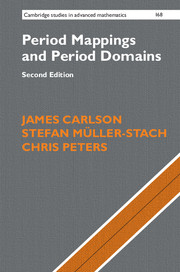Book contents
- Frontmatter
- Contents
- Preface to the Second Edition
- Preface to the First Edition
- PART ONE BASIC THEORY
- PART TWO ALGEBRAIC METHODS
- 6 Spectral Sequences
- 7 Koszul Complexes and Some Applications
- 8 Torelli Theorems
- 9 Normal Functions and Their Applications
- 10 Applications to Algebraic Cycles: Nori's Theorem
- PART THREE DIFFERENTIAL GEOMETRIC METHODS
- PART FOUR ADDITIONAL TOPICS
- Appendix A Projective Varieties and Complex Manifolds
- Appendix B Homology and Cohomology
- Appendix C Vector Bundles and Chern Classes
- Appendix D Lie Groups and Algebraic Groups
- References
- Index
10 - Applications to Algebraic Cycles: Nori's Theorem
from PART TWO - ALGEBRAIC METHODS
Published online by Cambridge University Press: 30 August 2017
- Frontmatter
- Contents
- Preface to the Second Edition
- Preface to the First Edition
- PART ONE BASIC THEORY
- PART TWO ALGEBRAIC METHODS
- 6 Spectral Sequences
- 7 Koszul Complexes and Some Applications
- 8 Torelli Theorems
- 9 Normal Functions and Their Applications
- 10 Applications to Algebraic Cycles: Nori's Theorem
- PART THREE DIFFERENTIAL GEOMETRIC METHODS
- PART FOUR ADDITIONAL TOPICS
- Appendix A Projective Varieties and Complex Manifolds
- Appendix B Homology and Cohomology
- Appendix C Vector Bundles and Chern Classes
- Appendix D Lie Groups and Algebraic Groups
- References
- Index
Summary
Deligne cohomology is a tool that makes it possible to unify the study of cycles through an object that classifies extensions of (p, p)-cycles by points in the p-th intermediate Jacobian (which is the target of the Abel–Jacobi map on cycles of codimension p). This is treated in Section 10.1 with applications to normal functions.
Before giving the proof of Nori's theorem in Section 10.6, we need some results from mixed Hodge theory. These are proven in Section 10.2 where we also state different variants of the theorem. Sections 10.3 and 10.4 treat a localto- global principle and an extension of the method of Jacobian representations of cohomology which are both essential for the proof. We finish the chapter with some applications of Nori's theorem and discuss the conjectured filtrations on the Chow groups to which these lead.
A Detour into Deligne Cohomology with Applications
Here we introduce Deligne cohomology in the form first defined by P. Deligne. We illustrate its connections to intermediate Jacobians and explain its functorial properties. Then we give the second proof of Theorem 9.1.3. The results of this section are not needed for an understanding of the rest of the chapter, and some readers may want to skip this section and read it later. In the historical remarks at the end of the chapter we point out some further directions where Deligne–Beilinson cohomology becomes more important. Deligne cohomology was defined first by P. Deligne and later extended by A. Beilinson. We use here mainly the original version of Deligne without growth conditions for noncompact spaces. Beilinson later imposed such growth conditions in order to get a more functorial theory. The extension of Beilinson has been worked out in detail in Esnault and Viehweg (1988).
Definition 10.1.1 Let X be a Kahler manifold. Define the analytic Deligne complex on X by
This is a complex of sheaves in the analytic topology and we put the first sheaf (2πi)pZ, which is a constant subsheaf of C, in degree 0. Hence the last sheaf, sits in degree p. We denote by
the 2p-th hypercohomology of this complex and call it the Deligne cohomology group of X.
- Type
- Chapter
- Information
- Period Mappings and Period Domains , pp. 272 - 306Publisher: Cambridge University PressPrint publication year: 2017

